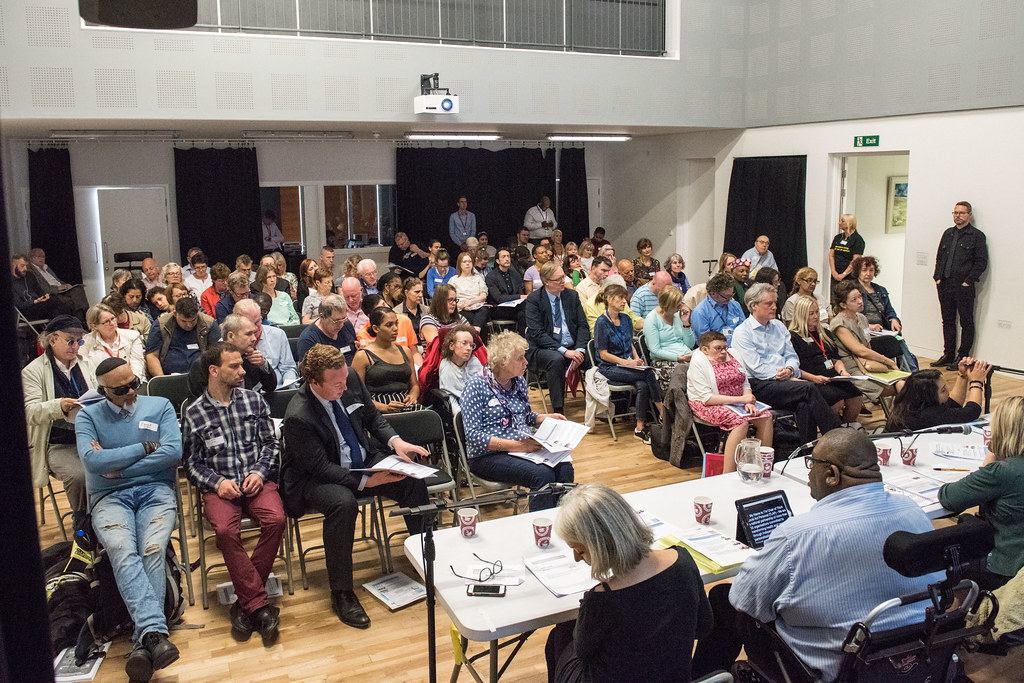An independent commission of Disabled residents in Hammersmith & Fulham today (20 June) launched its final report setting out far-reaching plans to change the way that H&F Council makes decisions.
These changes would significantly change how policy and services are designed and delivered in Hammersmith & Fulham and lead to the council being the best local authority in London in making decisions with Disabled residents and not for them.

Above: Click through the pictures from the event or go to the H&F Flickr Gallery Here
To assist, H&F Council asked well-known disability rights campaigner Tara Flood in 2016 to lead the commission to recommend a new way of doing things locally.
Commission chair and long-time local resident Tara said: “We are calling for a new culture in local government which means that Disabled residents and decision makers are working together in an active way to plan, design and review policy and services that affect our lives, to get rid of the barriers we face.
“The traditional ways of working must change. We hope that our eight recommendations will see change in Disabled residents’ daily lives and help H&F become the most accessible and inclusive borough in London.”
The commission
The DPC was made up of ten local Disabled people and guided by the principle of ‘Nothing about Disabled People Without Disabled People’, the Commission set about gathering the views of Disabled residents across the borough.
The report graphically highlights the many barriers still excluding local Disabled residents from much of everyday life that most other residents may not experience.
The report recommendations focus on a new approach to community and council partnership, that sees Disabled residents and council representatives as co-producers of change.
“In many respects, this has been an easy report to write because it recommends what Disabled people have been calling for over many years,” Tara added. “that we must be partners in the re-organisation of society and particularly decision making in everything that affects our lives.”
Cllr Stephen Cowan, Leader of H&F Council, said: “We aspire to be the most accessible borough because we value and respect the rights, equality, and contribution of disabled people.

“I am deeply grateful to Tara and the other Commission members who have worked so hard.
“We are not afraid to challenge unfairness and old-fashioned thinking in how we work. And these recommendations will make a major difference as we move towards making changes.”
Positive changes
Positive changes were already being made at H&F Council. In 2015, the council was the only authority in the UK to abolish home care charges.
In addition, H&F guaranteed to continue funding Disabled residents who were supported by the Independent Living Fund after the Government scrapped the national scheme.
The DPC report recommendations were accepted by the Cabinet at its meeting in December 2017 and change is already underway.
Design of new town hall
One of the recent examples of working towards co-production between H&F and local Disabled residents was the design process for the new Hammersmith Town Hall and surrounding area and western end of King Street.

Over a six-month period, paid members of a Disabled residents team, worked with architects from Rogers Stirk Harbour + Partners and the council’s housing and regeneration officers to make sure that the buildings and the public space would be designed as much as possible to include everybody.
Architect Mark Rintoul described the ‘co-production work’ as an ‘extremely beneficial collaboration’ that helped the scheme ‘exceed building regulations’ in relation to accessibility and inclusive design.
“The disabled residents’ first-hand experience informed the design and allowed us to overcome some challenges,” he added. “This level of community engagement is truly pioneering and one we fully endorse.”
While independent planning expert Lauren Patel, of firm Barton Willmore, said: “I have never experienced such a unique method of consultation and engagement. I would highly recommend the approach is adopted more widely going forward, both by the council on future major development schemes and others.”
Disabled resident Jane Wilmot said: “Working together meant we were able to raise issues early so the design team had time to respond with robust solutions. We strongly recommend this way of working because not only can it save time and money but disabled people were an integral part of creating a development that everyone can use.”
For more details on the Disabled People’s Commission click here.
To read the final report from the DPC and their eight recommendations click here.



